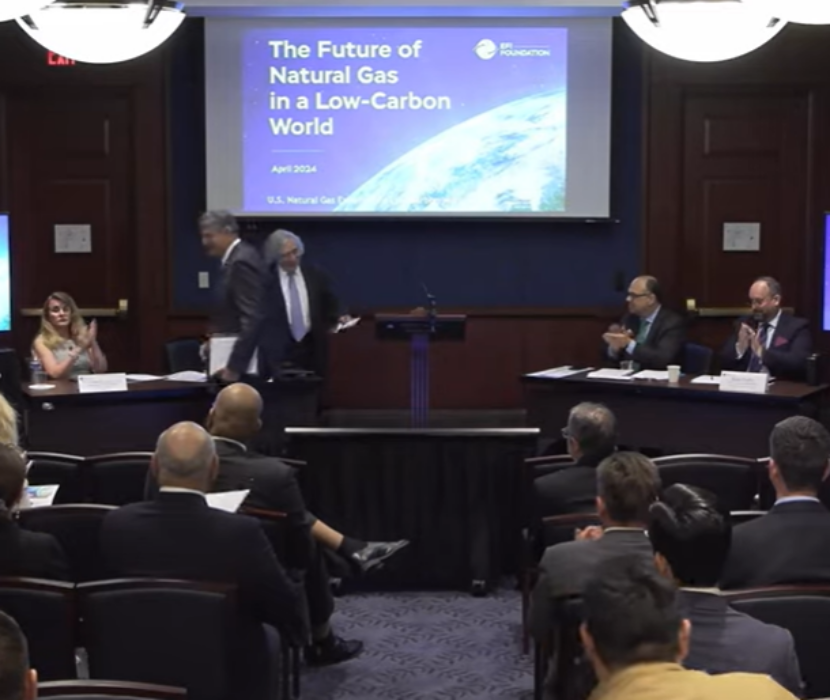
Clean hydrogen has great potential to advance the energy transition, and the Carolinas may be a good place to explore development of a regional clean hydrogen hub.
In 2021, the Energy Futures Initiative (EFI) held a public webinar that brought together stakeholders and leaders from industry, science, and government to examine how a clean hydrogen hub in North Carolina and South Carolina could serve as a pathway toward decarbonization and economic development. EFI later published a report with results from the webinar and an associated private roundtable. The conclusions from these events fed into analyses that shaped EFI’s 2023 The U.S. Hydrogen Demand Action Plan.
During the October 2021 webinar, EFI President and CEO Ernest Moniz emphasized the prosperity of the two states, noting that the regional economy is anchored by financial, technical, and scientific services, along with manufacturing and government enterprises.
“If it were its own nation, the Carolinas would be the 18th largest economy in the world, greater than quite a few other countries,” Moniz said.
He highlighted the capabilities that each state brings to the other in supporting clean hydrogen: North Carolina holds a world-class reputation in business services and biotechnology, and South Carolina is internationally recognized for distribution, advanced manufacturing, and logistics.
“All of these industries could play a major role in supporting a hydrogen hub in the region,” Moniz said.
Vahid Majidi, director of the U.S. Department of Energy’s (DOE’s) Savannah River National Laboratory, stated that out of the top 100 institutions that publish studies on hydrogen, six of them are in the Carolinas. Majidi said that the collaboration between these six organizations alongside industry can foster a network that “feeds the growth of the hydrogen economy.”
“I think it’s really the combination of the academic and the national laboratory research,” Majidi said. “What we are really good at, from the DOE’s perspective, is bringing research into large-scale production. A partnership with industry is really where… in the Carolinas, we can win and develop a hydrogen economy that benefits us.”
Lynn Good, president and CEO of Duke Energy, noted how public policy—combined with both activity at research universities and the operating expertise of utilities—can make hydrogen a cost-competitive resource in the Carolinas.
“Supportive public policy with the partnership, I believe, has the potential to accelerate [hydrogen] development,” she said.
Two examples of federal legislation that support clean energy goals are the passage of the Bipartisan Infrastructure Law in 2021, which included $9.5 billion toward clean hydrogen initiatives, and the Inflation Reduction Act in 2022 which offers a production tax credit to build out clean hydrogen facilities over a 10-year period.
Exploring Existing Hydrogen Projects
At the workshop, the first panel discussion focused on existing and emerging hydrogen hub projects in the United States and abroad, and how the successes of those projects can be recreated—specifically in the Carolinas—to support and accelerate the clean energy transition.
Led by Neva Espinoza, vice president of energy supply and low carbon resources at the Electric Power Research Institute, participants shared the breakthroughs of hydrogen in their respective areas.
Janice Lin, president of the Green Hydrogen Coalition, discussed HyDeal Los Angeles, the first initiative for her company’s platform, HyDeal North America. According to the Green Hydrogen Coalition, the initiative’s purpose is “to be a model of rapid acceleration for additional regional HyDeal ecosystem initiatives throughout North America.” Lin said HyDeal Los Angeles found that the city can achieve “mass-scale, low-cost delivered green hydrogen at under $2 per kilogram.” She said transport and storage infrastructure—hydrogen pipelines and underground geologic storage—play a key role in ensuring its success.
Lin highlighted the value of an ecosystem that includes production, infrastructure, and multi-sectoral demand, with special attention to a “bankable off-taker” as a starting point in building out a hydrogen hub in the Carolinas. She said a bankable off-taker is like “glue that brings everyone together.”
“In the case of Los Angeles… we have a very motivated local utility that has a commitment to 100% clean energy by 2035,” she said. “The power of the hub is bringing those off-takers together with the ecosystem partners that can realize a big vision.”
Joe Howe, professor and executive director at the Thornton Energy Research Institute, echoed similar sentiments. Howe is the academic lead for HyNet, a project touted as the United Kingdom’s leading industrial decarbonization project. He focused on Northwest England, stating that the area is the leading industrial cluster with the ability to take advantage of the opportunities that hydrogen presents.
Howe pointed to the collective approach with industry, communities, local regulators, and local governments. He said approaching governments for incentives and revenues to help build out demonstration plants and facilities is crucial in the beginning stages of hydrogen market development.
Randolf Weterings, senior program manager at the Port of Rotterdam, explained decarbonization efforts in Northwestern Europe. He said that region has an extensive network for grey hydrogen (hydrogen produced from fossil fuels without capturing carbon emissions produced during the process), which is gradually moving toward blue hydrogen (hydrogen produced from fossil fuels with carbon capture and storage of emissions produced during the process).
Weterings stressed the importance of tapping into existing infrastructure to jumpstart hydrogen hub development.
“It’s really about connecting with the current industry and making use of the existing assets that you have,” he said.
Cosma Panzacchi, senior vice president of corporate strategy and sustainability at Siemens Energy, spoke specifically about the view of hydrogen clusters in Europe. He said the European strategy is to tap into the current European infrastructure (e.g., repurposing existing gas pipelines) that would progressively be converted into hydrogen infrastructure over several decades.
Panzacchi underscored the need for cohesive support from governments for pipelines to allow hydrogen to flourish. He used the example of the Netherlands, which he said has “definite regulatory support,” differing from other parts of the continent.
“Let’s hope that at least the United States gets it right from the very start,” he said.
Ongoing Hydrogen Activities in the Carolinas
The second panel discussion, led by Scott McWhorter, chairman of the Southeast Hydrogen Energy Alliance, included commentary from key hydrogen stakeholders on better understanding hydrogen opportunities and their perspectives on how a hydrogen ecosystem can develop to aid in achieving decarbonization goals in the Carolinas.
Swati Daji, senior vice president of enterprise, strategy, and planning at Duke Energy, said that hydrogen is needed to reach net zero goals in the Carolinas and beyond. She described hydrogen as a “versatile technology” with many potential use cases and said that staying open-minded to the possibilities coupled with a network of support can help the buildout of a hydrogen market.
Daji, like most of the workshop participants, was direct about the need for support from a policy perspective.
“Support from government and regulators to allow for us to test, to recover, to think about these resources… as part of our [hydrogen] ecosystem will be super important,” she said. “And I think that for any technology, not just hydrogen, that is do-or-die.”
Brian Storey, director of energy and materials at the Toyota Research Institute, shared his perspective on hydrogen goals in transportation sectors, which are challenging to decarbonize.
“There’s a lot of shipping that comes through … Charleston and Savannah,” he said. “So [the Carolinas are] a great testbed for these difficult sectors like trucking, shipping, and all the other transportations.”
Roger Martella, chief sustainability officer at General Electric, spoke about hydrogen in the energy sector. He said at General Electric, there is a focus on hydrogen as an innovative technology to assist in decarbonization goals and that the Carolinas are positioned to lead in this innovation.
“The Carolinas can help demonstrate that hydrogen can be used today to provide reliable energy,” Martella said. “[The Carolinas] show that you can use hydrogen in a reliable way and [are a] proof point for generating hydrogen through a variety of different sources. I see the Carolinas [and the hub concept] as a really great fit.”
Read the workshop report, watch a recording of the panel discussions, and find more related resources on clean hydrogen hubs: The Potential for Clean Hydrogen in the Carolinas.
– Kaycee Hubbard, Communications Intern
(Share this post with others.)




